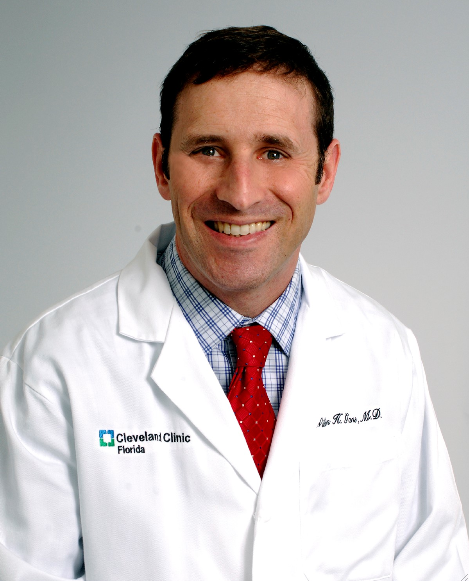Cleveland Clinic Survey: Men will do almost anything to avoid going to the doctor

MENtion It® campaign examines barriers that stop men from seeking care
A new survey by Cleveland Clinic reveals why a lot of men avoid going to the doctor and why some men hold back on certain issues once they’re at the doctor’s office.
In an online survey among approximately 1,174 U.S. males 18 years or older, Cleveland Clinic found that 72 percent of men would rather do household chores, like cleaning the bathroom or mowing the lawn, than go to the doctor. Even for the men who take their health more seriously, some are holding back: 20 percent of men admit they have not been completely honest with their doctor before.
The survey was issued as part of Cleveland Clinic’s fourth annual educational campaign, “MENtion It®,” which aims to address the fact that men often do not “MENtion” health issues or take steps to prevent them. This year, Cleveland Clinic set out to gauge where taking care of their health fell as a priority for men. Only half (50 percent) of men surveyed said that they consider getting their annual check-up a regular part of taking care of themselves.
“Unfortunately, many men do not make their health a priority until they have a health scare or a major issue,” said William Gans, MD, Urologist at Cleveland Clinic Florida in Weston. “We hope that this campaign raises awareness about the issues that keep men from being proactive in seeking the preventive care that can improve their quality of life long term.”
In recognition of International Men’s Day, on November 19, medical professionals at Cleveland Clinic are also reminding the Cayman population of the importance of regular screening and annual health check-ups. Many times, signs of conditions that concern the male population, such as prostate cancer, are first detected by a doctor during a routine check-up. This is of particular importance in the Cayman Islands as prostate cancer is the most reported cancer affecting male patients, according to the Cayman Islands Cancer Registry. Ethnicity is one of the top risk factors for prostate cancer with increased occurrence in black African and Afro-Caribbean males.
Key survey findings:
- 77 percent of men who are married or in a domestic partnership would rather go shopping with their wife or significant other than go to the doctor.
- 46 percent of men are most uncomfortable talking to their doctors about sex-related concerns, such as “below the belt issues” (skin irritations, erectile dysfunction, sexually transmitted diseases/infections) and/or their sexual history
- Among
the 20 percent of men who have not been completely honest with their
doctor in the past, the top reasons why include:
- they were embarrassed (46 percent)
- they didn’t want to hear that they needed to change their diet/lifestyle (36 percent)
- they knew something was wrong but weren’t ready to face the diagnosis and/or would rather not know if they have any health issues (37 percent)
- 41 percent of men were told as children that men don’t complain about health issues
- 82 percent of men try to stay healthy to live longer for friends and family who rely on them, yet only 50 percent engage in preventative care
Another key finding was that 61 percent of men said they would be more likely to go to their annual check-up if seeing the doctor was more convenient for them. Cleveland Clinic now offers access to care through many platforms, including virtual visits and Saturday appointment hours.
Visit www.clevelandclinic.org/MENtionIt for more information about men’s health and important preventive steps every man can take.
Methodology
Results of an online survey conducted among a national probability sample consisting of 1,174 American males 18 years of age and older, living in the continental United States. The total sample data is nationally representative regarding age, gender, ethnicity and educational attainment. The online surveys were conducted by YouGov and completed between April 9-11, 2019. The margin of error (MOE) for the total sample of each survey at the 95% confidence level is +/- 2.86 percentage points.
About Cleveland Clinic Florida
Cleveland Clinic Florida is a nonprofit, multi-specialty, academic medical center that integrates clinical and hospital care with research and education. With locations in Weston, Fort Lauderdale, Coral Springs, Parkland, West Palm Beach, Wellington, and Palm Beach Gardens, Cleveland Clinic Florida has more than 250 physicians with expertise in 55 specialties. The medical campus is fully integrated and includes diagnostic centers, outpatient surgery and a 24-hour emergency department located in the state-of-the-art hospital. Cleveland Clinic Florida ranked #1 among the best hospitals in the Miami-Fort Lauderdale metro area and fourth in Florida in US News & World Report’s 2019-2020 ranking of Best Hospitals metro area rankings. Cleveland Clinic Florida is an integral part of Cleveland Clinic in Ohio, where providing outstanding patient care is based upon the principles of cooperation, compassion and innovation. Physicians at Cleveland Clinic are experts in the treatment of complex conditions that are difficult to diagnose. For more information about Cleveland Clinic Florida, visit www.clevelandclinicflorida.org. Follow us on Twitter and Facebook.





